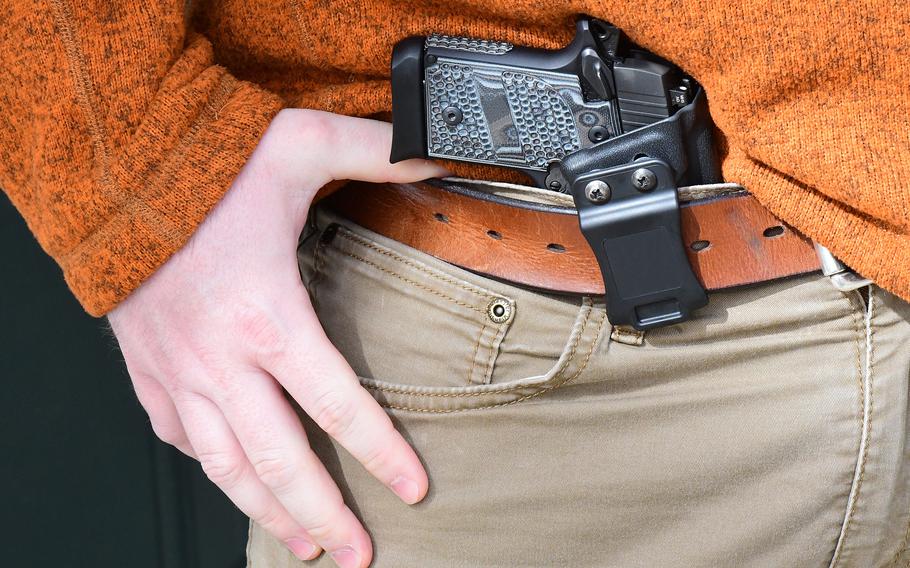
D.C. prohibits people with concealed-carry permits to carry weapons in more than a dozen locations designated “sensitive areas,” including schools, government buildings, polling places, medical offices and businesses serving alcohol, in addition to the transit system. (Eric Pilgrim/U.S. Army)
Four men with permits to carry concealed handguns in Washington, D.C., sued the city on Thursday, arguing that the ban on carrying firearms in the Metro transit system is unconstitutional under a recent Supreme Court ruling.
The lawsuit, filed in U.S. District Court in Washington, cites the Supreme Court’s June 23 decision that makes it harder for governments to restrict the carrying of pistols outside the home. Writing for the court’s 6-to-3 conservative majority, Justice Clarence Thomas said that to ban concealed handguns in a particular place, “the government must demonstrate that the regulation is consistent with this Nation’s historical tradition of firearm regulation.”
D.C. prohibits people with concealed-carry permits to carry weapons in more than a dozen locations designated “sensitive areas,” including schools, government buildings, polling places, medical offices and businesses serving alcohol, in addition to the transit system. In the lawsuit filed Thursday, the plaintiffs argue that Metro should be removed from the list.
“Public transportation vehicles and stations, essentially the D.C. Metro, share few, if any, characteristics supporting the designation of other locations as sensitive areas,” the lawsuit says.
Unlike schools and government offices, for example, the Metro system is “not populated with individuals who would be high-value targets to a terrorist or active killer,” the plaintiffs contend. “They are not landmarks or symbols of our nation which would be inviting to terrorists or active killers. . . . There is not a tradition or history of prohibitions of carrying firearms on public transportation vehicles. In short, there is no basis to label the Metro as a sensitive area.”
The office of D.C. Attorney General Karl Racine, D, vowed to fight the lawsuit — one of many such cases that are likely to arise across the country in light of the Supreme Court’s ruling last week in New York State Rifle & Pistol Assoc. v. Bruen.
Racine “will continue to defend the District’s common-sense gun regulations and keep District residents safe,” the office said in a statement. “As the Supreme Court said, the Second Amendment is not a license to keep and carry any weapon in any manner for any purpose.”
Although the lawsuit challenges only the ban on guns in the transit system, George Lyon Jr., a lawyer for the plaintiffs, said other locations on the prohibition list are “questionable” and could be the focus of future litigation.
“I don’t think anyone at this stage can complain about [barring guns in] schools or government buildings or polling places or around the White House or the vice president’s residence,” Lyon said in an interview.
“But once you get away from that, things start to become much less certain,” he said. “For example, I’ll give them penal institutions and I’ll give them mental hospitals. But I’m not sure I can give them doctors’ offices or veterinary offices.”
His clients are identified in the lawsuit as Gregory Angelo, Tyler Yzaguirre and Cameron Erickson of Washington, D.C., and Robert Miller of Fairfax County, Va. The lawsuit says the four are regular users of the Metro system and all have permits to carry concealed handguns in D.C.
The city’s gun laws have been a continual focus of legal challenges for years.
In 2008, the Supreme Court invalidated the city’s decades-old ban on handgun ownership in District of Columbia v. Heller, a landmark ruling that said the Second Amendment guarantees the right to own firearms unconnected with service in a militia. The court in Heller also said that governments could enact reasonable firearms restrictions, and Washington, D.C., adopted a regimen of controls, including a ban on concealed carry.
The ban was later thrown out by a judge, after which the city adopted a list of “sensitive areas” where people with concealed-carry licenses would be barred from carrying their weapons.